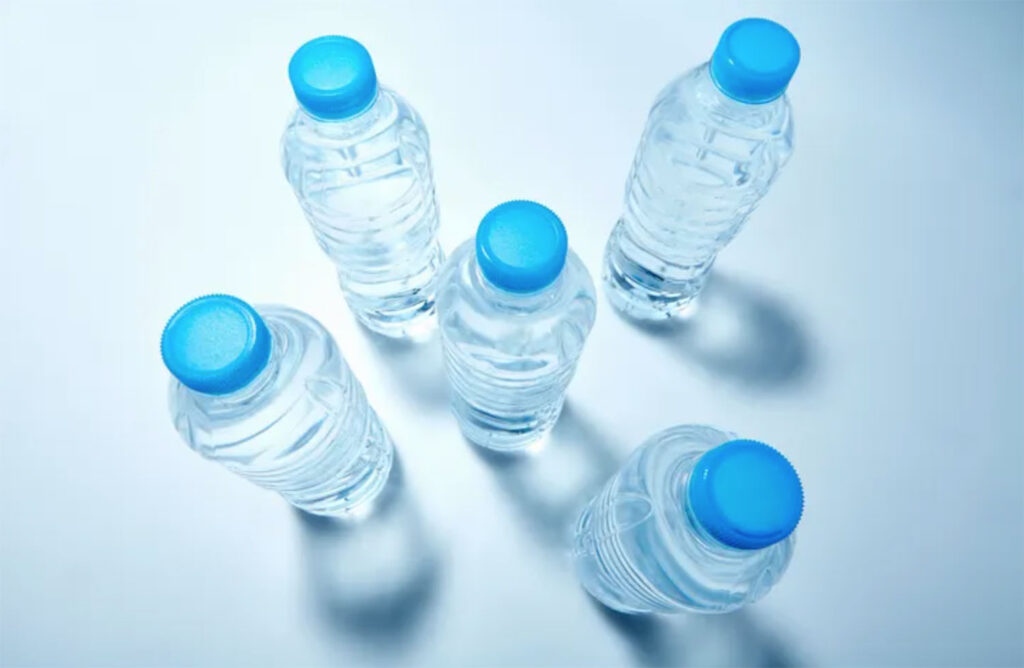If you drink bottled water and think it’s safe, you may want to reconsider. Evidence shows there are potentially harmful health impacts from chemicals in bottled water due to the packaging and water itself, according to this comprehensive and stunning HuffPost article. The chemicals used to make plastic water bottles are linked to a number of serious health effects and increase the total load of already present endocrine-disrupting chemicals.
Studies of several popular bottled water brands have found traces of pharmaceuticals, microplastics, bacteria and heavy metals, such as lead. The National Library of Medicine found toxins, bacteria, fungus and “microbiological pollutants” in bottled water that are responsible for different diseases in humans, most frequently gastroenteritis or stomach flu. Finally, each bottle of water has a big carbon and water footprint.
Phthalates
Phthalates are used to make water bottles and other plastics more durable and flexible, but exposure to them is of great concern because of its effect on the endocrine system. They’re linked to reproductive, immune, and neurological disorders, such as gestational diabetes, ADHD, fertility issues, liver disease in kids, asthma and an increased risk of breast cancer.
Some studies have found that plastic water bottles alone don’t have contamination levels significant enough to cause harm to bottled water drinkers. However, multiple experts told HuffPost that because most people are already exposed to endocrine-disrupting chemicals from many other sources every day (from housecleaning products to some fragrances), it may be wise to limit additional exposure to such chemicals where possible.
Though phthalates and other endocrine-disrupting chemicals aren’t usually detected in water at its original source, the plastic surrounding bottled water can contaminate the liquid over time. Degrees of contamination vary, but experts say that plastic-to-liquid contamination is mostly exacerbated by two things: the amount of time the plastic and drink (or food) are in direct contact, and whether the plastic has been heated while touching the food or liquid.
Bottled water is concerning on both fronts because it’s often stored in warehouses for extended periods of time and then on modes of transportation where temperatures can be high. “Water bottles can be susceptible to contamination because of the prolonged direct contact between the water and the plastic packaging materials.”
Metals, bacteria, plastic pieces and more
“Studies have found traces of pharmaceuticals, microplastics, bacteria and heavy metals,” according to Emily Barrett, a professor at Rutgers School of Public Health. Indeed, a Journal of Environmental Health study found heavy metals such as silver, barium, cobalt, chromium, copper, nickel, lead and zinc in several popular bottled water brands. Testing by Consumer Reports in 2020 found worrisome levels of arsenic in some bottled water as well.
Toxins, bacteria, fungus and “microbiological pollutants”
What’s more, research published in 2019 by the National Library of Medicine also found toxins, bacteria, fungus and “microbiological pollutants” in bottled water that are responsible for different diseases in humans, most frequently gastroenteritis or stomach flu.
The Centers for Disease Control and Prevention has warned that “contaminated bottled water can harm your health, including causing gastrointestinal illness, reproductive problems, and neurological disorders.” It states that people with weakened immune systems “may be more likely to get sick from some contaminants” and advises what immunocompromised people can look out for on bottled water labels to protect against the microscopic parasite Cryptosporidium, also known as Crypto.
Carbon and water footprints
For starters, the life cycle of each bottle of water comes with a hefty carbon footprint that contributes to climate change. It also causes tremendous pollution as only an estimated 29.1% of PET bottles and jars end up being recycled.
What’s more, the manufacturing of bottled water has a massive water footprint as well. According to NPR, the amount of water going into packaging, transportation and production of each bottle could end up being six to seven times the amount of water that’s inside each bottle.
So what can we do to avoid drinking water from plastic bottles?
- Drink tap water if you’re able
- Get a filter for sink water
- Look for alternative bottles
- Store any plastic bottled water correctly

